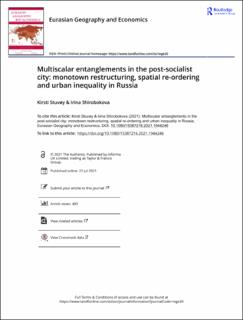Multiscalar entanglements in the post-socialist city: monotown restructuring, spatial re-ordering and urban inequality in Russia
Peer reviewed, Journal article
Published version
Permanent lenke
https://hdl.handle.net/11250/3007776Utgivelsesdato
2021Metadata
Vis full innførselSamlinger
Sammendrag
Monotowns in Russia epitomize the mixed history of Soviet industrialized urbanization and post-soviet transformation. The 2007–8 global financial crisis magnified socio-economic pro- blems in these cities. In spite of the deepened neoliberal urbanization observed across post-socialist cities and the glo- bal impetus of the crisis, monotowns were typically discussed within a national political framework. Our point of departure is that the monotown is an instructive site in which to explore the conundrum of global-local interconnections. To develop this argument, we conceptualize multiscalar entanglements as a base to combine analytical attention to subjective narratives with an interest in (global) structuring forces. We use this to empirically examine logics of spatial re-ordering in Russian monotowns in two analytical steps: First, we observe how federal policy introduced in response to the global crisis rede- fined monotowns from being territories of “crisis” and “risk” into those that offered spaces of development. Second, we focus on a particular study-site, the city of Zapolyarny and explain how the city-forming enterprise has initiated a recon- struction of the city. We find that the enterprise has reemerged as an urban governing body. In conclusion, we draw attention to emerging trends in urban inequality and insecurity consti- tuted by these logics of spatial reordering. Multiscalar entanglements in the post-socialist city: monotown restructuring, spatial re-ordering and urban inequality in Russia
